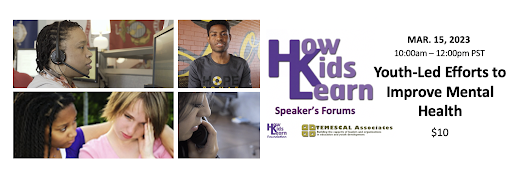Youth are clear: they want to be involved as part of the mental health solution!
In part 1 of A Case for Involving Youth to Address the Youth Mental Health Crisis, we focused on reasons to involve youth in efforts to address the youth mental health crisis. Below we profile some youth-led efforts dedicated to this. We hear directly from involved youth leaders through our interviews or informational videos.
Hope Squad
According to the Hope Squad National Council, the Hope Squad program is a school-based peer support team that partners with local mental health agencies. Hope Squads seek to reduce self-destructive behavior and youth suicide by training, building and creating change in schools and communities.
Peers select students who are trustworthy and caring individuals to join the Hope Squad. Squad members are trained to watch for at-risk students, provide friendship, identify suicide-warning signs, and seek help from adults. HOPE Squad members are NOT taught to act as counselors but are educated on recognizing suicide warning signs and how to properly and respectfully report concerns to an adult.
“Some students won’t get help because they’re just afraid to ask for it,” said Sofia, a senior at Hilliard Davidson High School. But if a peer knows, and if their struggle is seen and heard, then they’re able to say, OK, yes, I do need the help. And we can get them to go to an adult themselves.” - Students Train to Spot Peers with Mental Health Struggles and Guide Them
Click on the image below to view a video of statements by Hope Squad youth volunteers.
 |
| Source: 2022 Hope Squad National Conference |
According to their website, Grant Us Hope is a change agent for teen suicide prevention in the Greater Cincinnati region. They are passionate about providing a platform for teens, parents, and families to engage in pro-mental health conversations, activities, and solutions, and they’re committed to expanding the availability, reach, and impact of mental health services for teens in distress.
Grant Us Hope also implements a Hope Squad program, which they describe as “an evidence-based peer-to-peer suicide prevention program. This school-based initiative includes ongoing mental health/suicide prevention curriculum and empowers youth to apply the lessons using their own creativity”.
“Seven out of 10 youth say that when they are struggling with something, they are more likely to confide in a peer than a trusted adult.” - Grant Us Hope
You can click on the image below to view a video to learn more about their youth-led efforts.
 |
| Source: Grant Us Hope- Hope Squad |
YouthLine
YouthLine’s website describes their program this way: “We are teens helping teens. YouthLine is a teen-to-teen youth crisis and support service provided by Lines for Life—a non-profit dedicated to preventing substance abuse and suicide.
YouthLine operates a national helpline that provides crisis support and referrals via call, text, and chat. The YouthLine is answered by teen volunteers daily from 4pm-10pm PST (and by adults at all other times!). Translation services are available upon request. YouthLine also operates a peer-supported outreach program to destigmatize mental health challenges, increase awareness for mental health and wellness, and encourage youth to reach out for help. YouthLine’s helpline and outreach programs are supported by their youth development program, which builds skills and confidence around mental health and wellness.
In the Portland YouthLine program each youth volunteer gets more than 60 hours of training, and master's level supervisors are constantly on standby in the room, listening in and reading along, ready at a moment's notice to step in if needed. The PBS News Hour recently toured the Portland YouthLine program. You can click on the image below to view their broadcast.
 |
| Source: PBS News Hour |
Simply Wholehearted
Simply Wholehearted is a non-profit organization providing leadership opportunities to historically excluded students in low-income communities, creating game-changers who live, lead, and inspire. Their goal and mission are to provide equal access leadership with no borders because they believe that leadership shouldn’t be exclusive to specific communities. Simply Wholehearted was founded by Axel Perez. He was 18 when Simply Wholehearted was formally founded (15 if you count the first version created, which stems from his podcast).
Simply Wholehearted supports the youth mental health crisis by connecting them with extracurricular activities that can help boost their mental health and provide resources for organizations servicing mental health. In doing so, they have connected youth to soccer, dance, and student government opportunities. Additionally, Simply Wholehearted has hosted mental health workshops for middle and high school students during the summer in partnership with local school districts.
“Youth can get involved by becoming advocates of change and mental health. It is vital that youth speak up and destigmatize mental health, but most importantly, amongst their peers. Sharing their stories and what has helped improve their mental health is a great start, as well as creating school-wide campaigns to recognize mental health and share resources with the school community. Reaching out to school staff, district services, and community organizations and collaboratively bringing them all together to create an awareness event creates an opportunity for youth leadership, especially when it’s student-run and organized.” - Axel Perez, Co-Founder and President, Simply Wholehearted
WEBINAR RECORDING
This webinar features youth leaders who have worked to improve youth mental health and are associated with Simply Wholehearted, Hope Squad and YouthLine (providing peer-to-peer mental health support). We hear their perspectives on the importance of engaging youth in mental health initiatives. Our speakers share their programs they are involved with, direct participants to resources, and answer any questions. To watch this webinar, click here.















